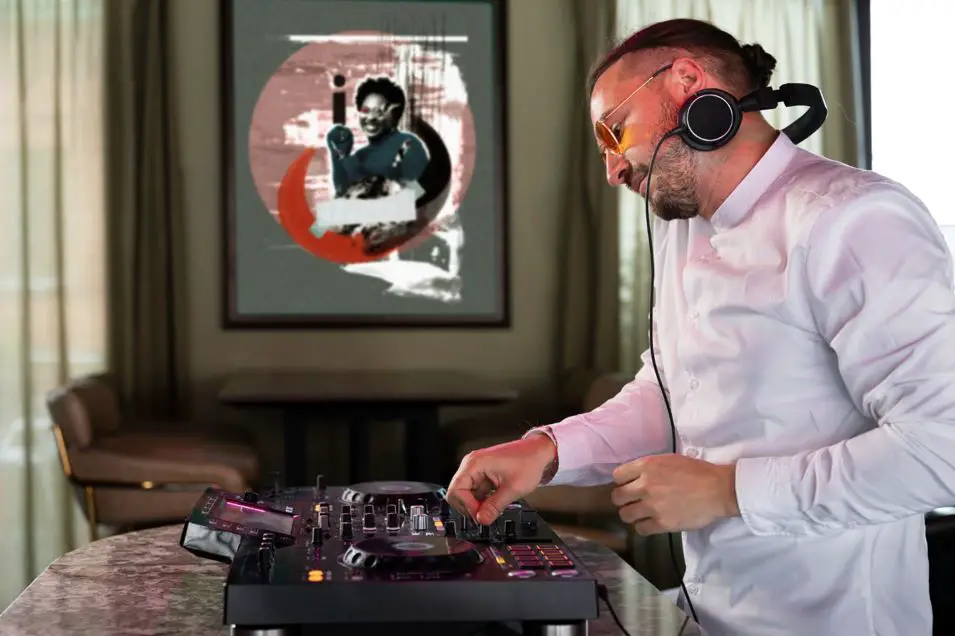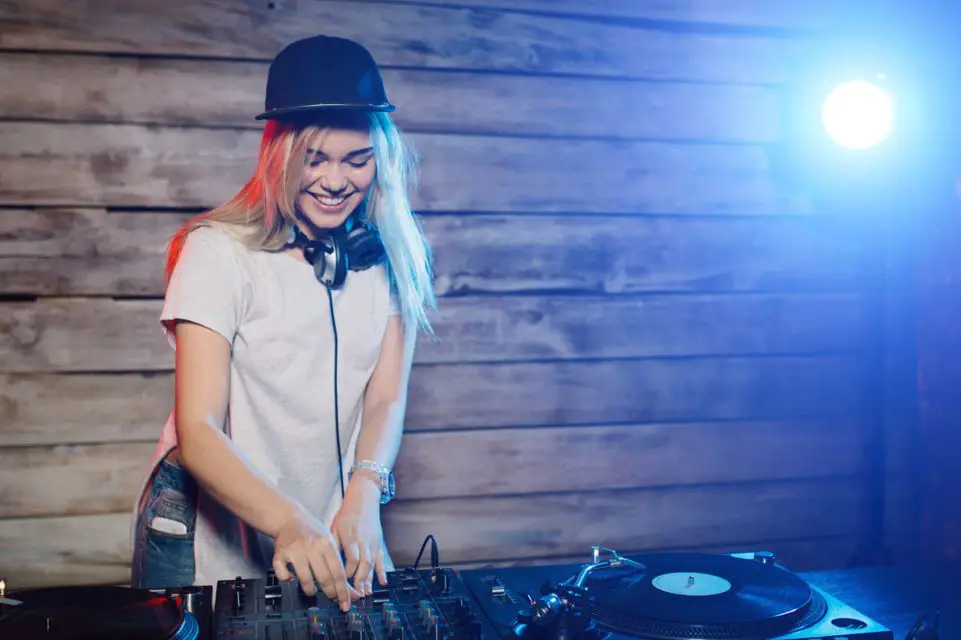When planning a wedding, one of the essential decisions is entertainment. Many couples often ask, “How much does a DJ cost for a wedding?” or “What is the average price of a DJ for four hours?” In this article, we’ll provide a detailed breakdown of wedding DJ costs, factors influencing those prices, and what you can expect when hiring a DJ for your big day.
Let’s get straight to the point
The cost of hiring a wedding DJ typically ranges from $400 to $2,500, depending on factors like the date, location, event length, and the DJ’s experience. Peak seasons, Saturdays, and long events usually cost more. Cheaper DJs might have risks, such as poor preparation or limited availability, while experienced DJs ensure a seamless reception.
Additional services like lighting, special effects (fog machines, bubble makers), and custom playlists can raise costs. DJs may also serve as emcees, which increases their fees. Many DJs offer both flat-rate and hourly packages, with prices generally between $650 and $900 for flat-rate deals.
It’s recommended that you book a quality Dk eight months in advance. Whether you choose a DJ, a live band, or both for your wedding, the key is to find entertainment that matches your style and keeps your guests engaged.
Average Cost of a Wedding DJ

The cost of hiring a wedding DJ for a four-hour event can vary significantly depending on several factors, such as location, the DJ’s experience, and the type of wedding you’re planning. Generally, you can expect to pay between $400 and $600 for a DJ. However, more experienced DJs with professional equipment and extensive preparation may charge more.
It’s important to remember that opting for the cheapest DJ option may come with risks. Cheaper DJs often have limited availability, may lack the necessary preparation, and can fail to deliver a smooth and professional experience. If you’re looking for someone who will ensure that your wedding reception runs smoothly, investing in a skilled DJ is often worth the cost.
Factors Affecting Wedding DJ Costs
Several key factors come into play when determining how much a DJ will cost for your wedding. The main factors include:
1. Date, Time, and Location (DTL)
The date, time, and location of your wedding significantly influence DJ costs.
- Date: Weddings during peak seasons (April to October) generally cost more than off-season weddings (November to March).
- Time: Saturdays, being the most popular wedding day, are typically the most expensive. Weddings held on weekdays or Sundays are more affordable.
- Location: DJs charge more if they need to travel long distances or if the venue has logistical challenges, such as a lack of parking or difficult loading areas.
2. Type of Event
Weddings are generally more expensive for DJs than birthdays or anniversaries. The level of preparation, equipment required, and specific expectations of a wedding DJ are higher.
For example, DJs for bar mitzvahs can be more expensive than for weddings due to the need for added entertainment duties, such as emceeing and keeping younger guests engaged. This can raise the price by 32% compared to a wedding DJ.
3. Event Length
The duration of your wedding event directly impacts the cost of the DJ. Most DJs offer packages for specific time frames, such as four hours, with additional overtime charges. It’s also common for DJs to provide hourly rates for events that extend beyond the agreed-upon time.
Many DJs are willing to adjust their rates if they are booked longer, as the equipment is already set up, and they are prepared to entertain for an extended time.
Equipment Quality and Setup
One of the primary reasons professional DJs charge higher fees is their investment in high-quality sound and lighting equipment. Superior gear ensures the sound quality is clear and consistent throughout the event. Professional-grade speakers, microphones, and lighting systems contribute to the overall experience, providing polished and professional service.
Some DJs offer premium packages that include advanced sound systems, subwoofers, and additional lighting effects. These can transform your venue and create a more dynamic party atmosphere. If your DJ is responsible for sound and lighting, they will likely charge extra for these services.
Example of DJ Equipment Packages
- Basic Package: Includes essential sound system, lighting, and music playlists.
- Premium Package: Upgraded sound system, more sophisticated lighting options, and additional services like fog machines or LED dance floors.
- Deluxe Package: Custom lighting design, professional-grade sound, and interactive features like live video feeds or special visual effects.
4. Special Requests
Most DJs are flexible with their playlists, but the cost could increase if you have specific musical preferences or need them to source uncommon tracks. If your DJ doesn’t already own the rights to certain songs, they may need to purchase the music specifically for your event.
Additionally, if your wedding requires the DJ to act as both the DJ and master of ceremonies, the price may increase. Acting as the MC involves making announcements, coordinating with the event planner, and keeping the schedule on track. This added responsibility demands more time and attention from the DJ, often justifying a higher price.
DJ Experience and Reputation
More experienced DJs with a well-established reputation typically charge higher rates. Their experience ensures they can read the crowd, maintain the right atmosphere, and seamlessly manage transitions between songs and event activities.
High-Demand DJs
In-demand DJs with substantial local or national reputations command significantly higher rates. Depending on their popularity and demand, booking a celebrity DJ could easily cost thousands of dollars.
Hiring a regional or local DJ with positive reviews and experience can still provide a top-notch experience for couples on a more modest budget. Prices for these DJs generally range from $1,000 to $2,500.
Additional Services Offered by DJs

Beyond playing music, many DJs offer extra services that can elevate your wedding experience. These services often come at an additional cost but can provide a more immersive atmosphere for your guests.
1. Lighting Services
Lighting is one of the most popular additional services offered by wedding DJs. Many DJs offer uplighting packages that can enhance the ambience of your venue. Uplighting typically starts at $250 and can vary based on the complexity of the setup.
Other lighting options may include:
- Dance floor lighting
- Spotlights
- String lights for outdoor weddings
2. Special Effects
Some DJs offer additional effects, such as smoke machines, bubble makers, and laser light shows, to create an unforgettable wedding experience. While these extras can significantly increase costs, they are worth considering if you want to impress your guests with a unique, visually exciting reception.
3. Custom Playlists and Event Planning
Many DJs provide pre-wedding consultations to discuss the music preferences and the overall timeline of the reception. This process typically includes creating a customised playlist tailored to your event’s unique style. DJs may charge more if they need to make special accommodations or source music outside their standard collection.
Choosing Between a Live Band and a DJ
Deciding between a live band and a DJ for your wedding is a personal choice that depends on your musical tastes and the overall vibe you want for your reception.
- A DJ offers a wide range of music, from pop hits to classic tunes, ensuring something for everyone.
- A live band can provide a more intimate and dynamic performance, especially if you prefer live vocals and instrumentals.
Some couples opt for both, hiring a band for the earlier part of the evening and a DJ for the after-party. This combination provides a diverse entertainment experience and ensures guests remain engaged throughout the night.
Flat Rate vs. Hourly Rate
Some DJs offer a flat rate for their services, regardless of how long they play, while others charge by the hour. For example, some DJs offer a flat rate that covers all services, including pre-wedding consultations, equipment setup, and breakdown. A flat-rate package can be more convenient for couples who want a simple pricing structure without worrying about extra hourly fees.
Flat rates generally range from $650 to $900, depending on the DJ’s travel time, equipment needs, and additional services.
Booking Your DJ Early
It’s recommended to book your wedding DJ at least eight months in advance to secure your preferred date and time. Popular DJs often get booked quickly, especially during peak wedding season.
Before booking, schedule a consultation with the DJ to discuss your vision for the wedding, your music preferences, and any special requests. A professional DJ can offer guidance and help you craft a wedding playlist that aligns with your tastes and keeps your guests entertained.
Conclusion
The cost of hiring a DJ for a wedding can range from $400 to $2,500, depending on factors such as location, date, event length, and DJ experience. While budget-friendly options exist, it’s essential to choose an experienced and reliable DJ to ensure that your wedding reception runs smoothly.
Additionally, many DJs offer various extra services, such as lighting and special effects, that can enhance your event. Whether you opt for a DJ, live band, or a combination of both, the key is to choose entertainment that reflects your personality and keeps your guests engaged.
FAQs About Weddings DJs
How Long Does It Take a DJ to Set Up?
The DJ will arrive at a time to suit you (usually around 6pm) and set up their equipment where required. To unload and set up takes around 45 – 60 minutes depending on how much equipment the DJ has. They will then need to get changed.
Why Are Djs So Expensive?
The reason DJs make so much money is to do with the fact that they deliver an experience to an audience. This goes for any industry that’s primary job is to take you out of ordinary life and give you some escapism for a bit.
What Does a DJ Actually Do?
DJs typically perform for a live audience in a nightclub or dance club or a TV, radio broadcast audience, or an online radio audience. DJs also create mixes, remixes and tracks that are recorded for later sale and distribution.
How Do I Join a DJ Agency?
In order to join a reputable agency you will need to already have work experience or have a high profile. DJ agencies will make a profit on each of your bookings, known as a commission. Normally, DJ agencies will want to work with big-name DJs and not newbies. They will want to manage acts who are already popular.
What Are Dj Sets Called?
A DJ mixset is usually performed live in front of an audience in a nightclub, party, or rave setting. Mixsets can also be performed live on radio or recorded in a studio. Methods of mixing vary slightly depending on the music genres being played.

